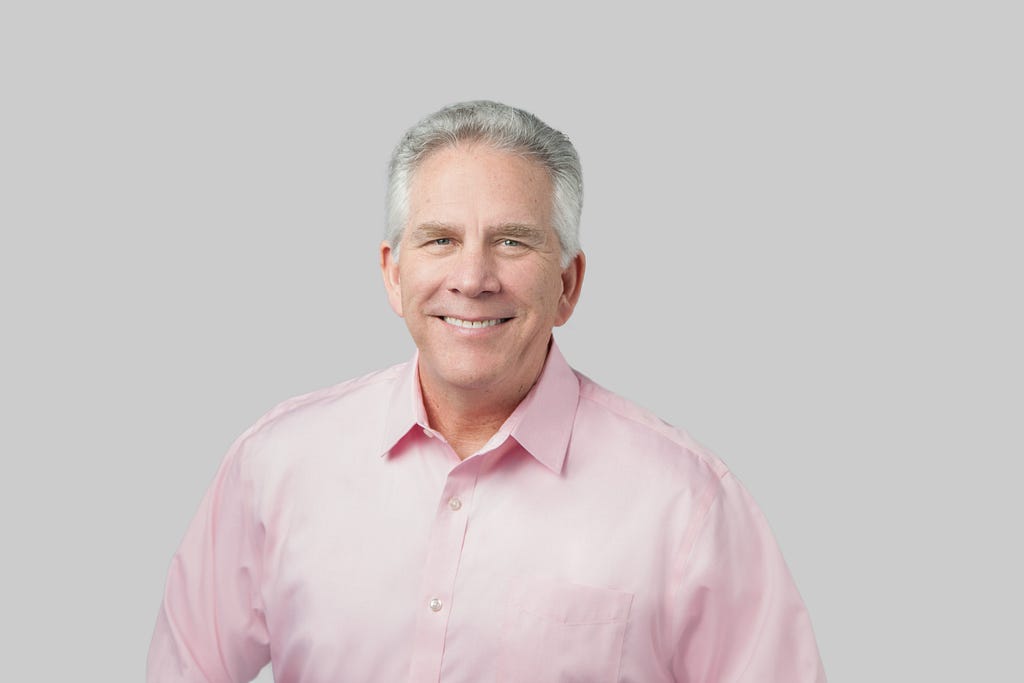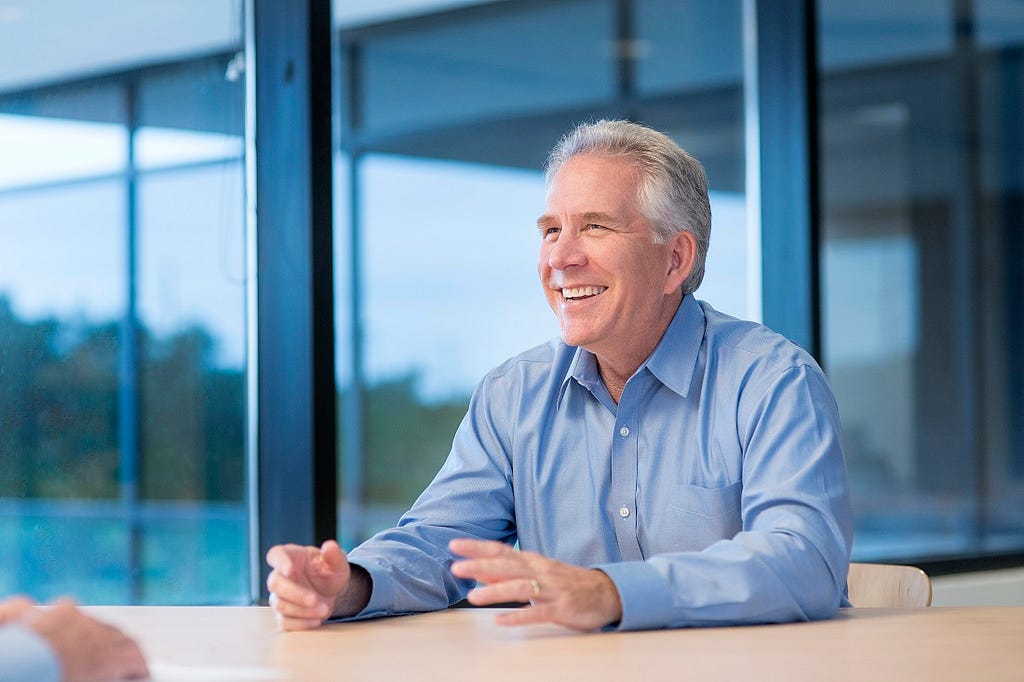Rising Through Resilience: “Why resilience is a result of incredible optimism” With Mark McClain, CEO of SailPoint

I think the simplest definition of resilience is simply getting back up when you are knocked down. One shining characteristic of this is an incredible level of optimism — when you say to yourself, “I will somehow find a path through this negative situation.” I think another characteristic is a healthy perspective of what a balanced life looks like. If your whole life is your career, and then suddenly that is taken away, what do you have left? Your whole world would collapse. If you flip it, and you have a horrible personal tragedy, but don’t have faith, family, friends, and colleagues to help support you, that could be devastating as well. Balance in life is everything.
I had the pleasure to interview Mark McClain. In his role as CEO and Founder of SailPoint (NYSE:SAIL), Mark brings almost 35 years of experience in technology, with over 20 years as a founder and leader of innovative identity management companies. Under Mark’s direction, the company has grown into a publicly recognized leader in its market. Mark directs and drives the overall vision and strategy for SailPoint, which is underpinned by his commitment and passion for building top-performing teams, creating a collaborative and innovative work environment, and focusing continuously on the needs of customers. Teaming is a concept that Mark promotes throughout the company: teaming with forward-thinking customers to understand their needs, with partners to ensure customer success, and ultimately within SailPoint to develop innovative, market-leading solutions. Mark is passionate about maintaining the spirit of teamwork, even as SailPoint grows its employee base and its global presence to offices around the world. Prior to SailPoint, he co-founded Waveset Technologies, which was ultimately acquired by Sun Microsystems. Mark’s career also includes diverse experience in international sales and marketing with Hewlett-Packard and IBM/Tivoli Systems.
Thank you so much for joining us Mark. Our readers would love to “get to know you” a bit better. Can you tell us a bit about your ‘backstory’?
M: I’m an accidental entrepreneur, and that’s where my story starts. A lot of entrepreneurs have childhood stories that show how they’ve always had that entrepreneurial spirit, but that just wasn’t me. I wasn’t that kid who started a lemonade stand and then hoped I could parlay that into my first “big business” in the neighborhood. I was the kid who threw on a baseball cap after school and headed to the park to play ball with friends. It cracks me up now to realize I am a serial entrepreneur and founder since I was never really headed down that path.
Out of college, I got a job at IBM and thought I’d be there until I retired. Then I moved to HP and, after a few years, realized that the corporate ladder path just wasn’t for me. I moved on to smaller companies and figured out that what I enjoyed was building teams and working toward achieving goals together. Ultimately, I took a chance and founded my first company in 2000 with some good buddies. The rest, as they say, is history.
What do you think makes your company stand out? Can you share a story?
M: What makes SailPoint stand out from the rest is our commitment to our internal values and delivering value to our customers. The 2008 recession hit SailPoint hard. As a 3-year old company at that point, our backers wanted us to make job cuts that would have affected about 30% of the team. We pushed back and said, “that’s not how we are going to do it here.” That was a vital culture point early on for SailPoint. We would work on a problem together, even experiencing some “shared suffering,” rather than take those kinds of cuts. Our people are everything to us, and that makes us stand out from the rest.
None of us can achieve success without some help along the way. Is there a particular person who you are grateful to who helped get you to where you are? Can you share a story?
M: Not a particular person, but there’s this concept: rather than having a single mentor, there are multiple people you go to for various reasons. You should have your personal “board of directors.” Someone you go to for career, someone you go to for your family. I practice this, and all these “directors” in my life have made me successful. However, if I had to name one person, I would say my wife, Marj. Not only has she been the perfect “teammate” for me in walking through life and raising our family; she was instrumental in helping me step out of my comfort zone and have the confidence to pursue an entrepreneurial journey.
Ok, thank you for all that. Now let’s shift to the main focus of this interview. We want to explore and flesh out the trait of resilience. How would you define resilience? What do you believe are the characteristics or traits of resilient people?
M: I think the simplest definition of resilience is simply getting back up when you are knocked down. One shining characteristic of this is an incredible level of optimism — when you say to yourself, “I will somehow find a path through this negative situation.” I think another characteristic is a healthy perspective of what a balanced life looks like. If your whole life is your career, and then suddenly that is taken away, what do you have left? Your whole world would collapse. If you flip it, and you have a horrible personal tragedy, but don’t have faith, family, friends, and colleagues to help support you, that could be devastating as well. Balance in life is everything.
When you think of resilience, which person comes to mind? Can you explain why you chose that person?
M: Abraham Lincoln. The man had a lot of setbacks — if you want to learn about somebody who didn’t quit, here’s a great example. He lost eight elections, twice failed in business, and suffered a nervous breakdown. I recently read about him in a great book called “Team of Rivals: The Political Genius of Abraham Lincoln”. In it, the author, Doris Kearns Goodwin, talks about his unexpected win of the presidential election (the one he did win!). All the other candidates who lost to him said terrible things about him, but instead of writing them off, he did something extraordinary — he invited them all to be his cabinet members. He knew that he couldn’t run the country without them. He is a compelling story of resilience and humility.
Has there ever been a time that someone told you something was impossible, but you did it anyway? Can you share the story with us?
M: When I founded SailPoint, I had a co-founder, Kevin. We shared leadership responsibilities. We even shared an office. A lot of our investors said, “you can’t be two-in-a-box.” They told us that it is impossible to be co-founders this close and for it not to end badly. We thought differently. We knew this shared leadership role was more beneficial than harmful. We fought the conventional wisdom that we shouldn’t operate as “two-in-a-box” colleagues — we did it this way for well over a decade and were successful.
Did you have a time in your life where you had one of your greatest setbacks, but you bounced back from it stronger than ever? Can you share that story with us?
M: Early on in one of the companies I founded, we had been pursued by a large company to be acquired, and that deal got far down the path, and then “blew up.” Then we got pursued by another company; it got further down the path, and then it “blew up” as well. We were so close to “grabbing the brass ring,” but it got yanked away from us not once, but twice. A lot of people were disappointed. It would have been a huge deal for us to get acquired.
That’s when I told the famous “buffalo story” at a company meeting to talk about the two failed deals. It goes like this — in a significant storm, a blizzard that sweeps across the plain kind of storm, all animals run from the storm — except one. The buffalo, amazingly, turns towards the storm and runs at it. By facing the challenge of the storm head-on, the buffalo gets through it more quickly than the animals running away from it. This can be applied in life. When you are facing a very dire situation — face into the storm instead of running from it, and quite often, it will pass much more quickly than you anticipated! I told this story at the company meeting after the deals fell through, and people still talk about it as a story that still resonates with them to this day about facing your challenges head-on.

Did you have any experiences growing up that have contributed to building your resiliency? Can you share a story?
M: After I graduated, I thought I might want to go to law school. After I was waitlisted and ultimately didn’t get in, I ended up going off to chase jobs and found my way into a tech company. But it wasn’t an easy go at it at first. When I applied to my first job, they sent me a rejection letter. According to the HR team, I wasn’t the right fit for the company. Not only did I not get into law school, but I was rejected for a job I wanted. I was disappointed and chatted with a friend who worked there. He bumped my resume along and, it turned out that when I actually got to speak with a hiring manager, I was the right fit. I eventually got hired at the company, but I always saved my rejection letter as a reminder to never give up easily. Later on, I was named “Rookie of the Year” for my region, so at least I helped that hiring manager look pretty smart for overruling HR!
You are a person of great influence. If you could inspire a movement that would bring the most amount of good to the most amount of people, what would that be? You never know what your idea can trigger. 🙂
M: I think a simple idea is that we can all be generous and compassionate and do things that help give back to those in need. Most of us in America are so ridiculously “wealthy” on a global scale that we could easily give away far more than we do, and still have a standard of living far beyond most of our fellow humans. That’s why giving back in whatever form you can (volunteering, monetarily, etc.) is such a huge component to our culture at SailPoint.
We are blessed that some very prominent leaders read this column. Is there a person in the world, or the US, with whom you would love to have a private breakfast or lunch with, and why? He or she might just see this, especially if we tag them 🙂
M: Colin Powell — I think he is one of the most impressive people. A great example of humility with great leadership qualities.
How can our readers follow you on social media?
You can check out my SailPoint blog here and my Forbes Technology Council blogs here. You can also follow me on LinkedIn.
Rising Through Resilience: “Why resilience is a result of incredible optimism” With Mark McClain… was originally published in Authority Magazine on Medium, where people are continuing the conversation by highlighting and responding to this story.



